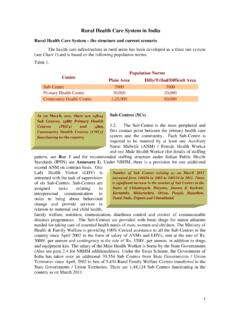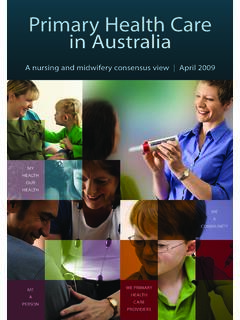Transcription of Racism, Inequality, and Health Care for African Americans
1 The Century Foundation | racism , inequality , and Health care for African AmericansDECEMBER 19, 2019 JAMILA TAYLORThe Century Foundation | 1 racism , inequality , and Health care for African AmericansDECEMBER 19, 2019 JAMILA TAYLORThe american Health care system in beset with inequalities that have a disproportionate impact on people of color and other marginalized groups.
2 These inequalities contribute to gaps in Health insurance coverage, uneven access to services, and poorer Health outcomes among certain populations. African Americans bear the brunt of these Health care Americans comprise percent of the Over the span of several decades, namely since the Civil Rights Acts of 1964 and 1968, they have been able to make notable strides in american society. According to the Economic Policy Institute, educational attainment has greatly increased, with more than 90 percent of African Americans aged 25 29 having graduated from high College graduation rates have also improved among African Americans .
3 When it comes to income, gains have been made as well, but African Americans are still paid less than white Americans for the same jobs and lag significantly behind when it comes to accumulating wealth. And as for home ownership, just over 40 percent of African Americans own a home a rate virtually unchanged since Americans are also living longer, and the majority of them have some form of Health insurance coverage. However, African Americans still experience illness and infirmity at extremely high rates and have lower life expectancy than other racial and ethnic groups. They are also one of the most economically disadvantaged demographics in this report will examine the state of Health care coverage for African Americans and shed a light on important social factors that uniquely impact their Health outcomes.
4 In an effort to draw implications from leading Health care reform plans, recommendations are made for the way forward in ensuring that the physiological and social impacts of racism are not omitted in efforts to secure truly universal Health care coverage in America. African Americans are one of the most politically engaged demographics in this country. Addressing their unique challenges and perspectives, including the pervasive impacts of racism , must be included in Health reform Gains and Obstacles for African Americans Under the ACAThe Affordable care Act (ACA) has helped to ensure Health care coverage for millions of Americans .
5 The uninsured rate among African Americans declined after the law was implemented: of the more than 20 million people This report can be found online at: Century Foundation | 2who have gained coverage under the ACA, million of them are Yet, this population is still more likely to be uninsured than white Americans : as of 2018, the uninsured rate among African Americans was percent, while it was just percent among African Americans were more likely to be covered through employer-sponsored or private Health insurance: 55 percent of African Americans used private Health insurance in 2018, while percent were enrolled in Medicaid or some other type of public Health coverage expansions under the ACA have hastened the progress toward universal coverage, the continued high cost of many coverage options means that access to affordable Health care is still a challenge for many Americans particularly African average family spends $8,200 (or 11 percent of family income)
6 Per year on Health care premiums, and out-of-pocket costs for things such as office visit copays, prescription drugs, and surprise or out of plan medical bills continue to wreak havoc on the financial security of For African Americans , the average annual cost for Health care premiums is almost 20 percent8 of the average household income a major cost to bear, when taking into account income inequality and other economic challenges for this high cost of coverage has kept the number of uninsured and underinsured unacceptably high: of the million people that still lack Health insurance coverage,9 45 percent cite cost as the reason for being Furthermore, the Commonwealth Fund estimates that an additional 87 million people (adults aged 19 to 64) are underinsured; that is, they have coverage, but their plan leads to unusually high out-of-pocket costs relative to income that can lead to a strain on personal finances or even debt.
7 Of these underinsured adults, 18 percent are Systemic Health care Challenges That Reform Must AddressDespite coverage gains, remaining Health care challenges exist that have a disproportionate impact on African Americans . The lack of Medicaid expansion in key states, Health disparities, and Health care provider shortages make it incredibly hard to address America s Health care needs in a comprehensive way. And while these challenges are factors that touch many Americans in various parts of the country, the gravity of them is uniquely seen in the South, and among the African - american South s Stubborn Approach to Medicaid ExpansionThe Medicaid program has been a lifeline for low-income Americans , pregnant people, the elderly, and people with disabilities.
8 It is jointly funded by states and the federal government, and has been operating for fifty-four As of August 2019, the program covered 68 million people, with African Americans making up about 20 percent of Medicaid Because African Americans tend to be poorer than other demographic groups on average, public Health insurance programs such as Medicaid are vital to ensure affordable Health care and healthier outcomes. In states that have not expanded Medicaid under the Affordable care Act (ACA), African Americans and other people of color are most likely to fall within a coverage gap meaning they earn too much to qualify for the traditional Medicaid program, yet not enough to be eligible for premium tax credits under marketplace the ACA, Medicaid eligibility was expanded for adults with incomes up to 138 percent of the federal poverty level (FPL).
9 15 This expansion was originally written into the ACA as a requirement for all states, but due to a 2012 Supreme Court ruling in National Federation of Independent Business v. Sebelius,16 it is now just an option for states. To date, thirty-seven states (including the District of Columbia) have expanded Medicaid, either through traditional means or the Section 1115 waiver The states that have not expanded Medicaid are largely concentrated in the southern region of the United States. (See Map 1.)The Century Foundation | 3In the South, African Americans are disproportionately represented. According to the Department of Health and Human Services Office of Minority Health , 58 percent of the African - american population lived in the South as of They are also more likely to be uninsured, with Texas, Florida, and Georgia being home to the largest shares of uninsured African Some states have also proposed draconian work requirements20 as a condition for the participation in the Medicaid program.
10 These requirements can only serve to stigmatize enrollees, deny coverage, and discourage low-income people from the support they desperately need. In Arkansas one of nine states to date with 1115 waivers approved by the Trump administration allowing fully implemented work requirements 18,000 low-income people lost Health care coverage as a This coverage loss comes as no surprise, because the use of work requirements for other safety-net programs, including Temporary Assistance for Needy Families (TANF), has proven them to be ineffective in their stated goal promoting employment yet highly effective in reducing program Medicaid wok requirements for three states have been struck down by the courts.

